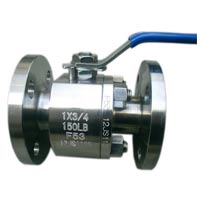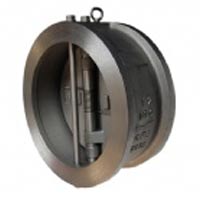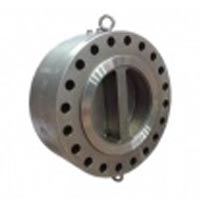Common materials for valves
(1) Cast iron
1. Gray cast iron, such as HT200, HT lung 0, etc., is suitable for the nominal pressure not greater than PN16, and the working temperature is -10~100℃. For oils and general liquid media (water, steam, petroleum products, etc.) between C, the nominal pressure is not greater than PN10. The working temperature is -10~200℃. Mediums such as steam, general gas, coal gas, ammonia gas between C (ammonia, alcohol, vinegar, aldehydes, rewards, friezes and other low corrosive media). It is not suitable for media such as hydrochloric acid and nitric acid. But it can be used in concentrated sulfuric acid because concentrated sulfuric acid can produce a passivation film on the metal surface to prevent the corrosion of cast iron by concentrated sulfuric acid.
2. Malleable cast iron, such as KTH350-10, KTH450-06, etc., is suitable for steam, general gas, liquid, oil and other media with nominal pressure not greater than PN25 and working temperature between -10 and 300℃. Its corrosion resistance is similar to gray cast iron.
3. Nodular cast iron, such as QT400-I5`QT450-I0, etc., is suitable for the nominal pressure not greater than FN25, and the working temperature is 10-300. The medium between C and steam, general gas and oil. It has strong corrosion resistance and can work in a certain concentration of sulfuric acid, nitric acid, and acid salt. But it is not resistant to corrosion by chloric acid, strong alkali, hydrochloric acid and ferric chloride hot solution. Avoid sudden heat and cold during use, otherwise it will break.
4. Nickel cast iron has stronger alkali resistance than gray iron and ductile iron valves. It is used in dilute sulfuric acid, dilute hydrochloric acid and caustic alkali. Fetter iron is an ideal valve material.
(2) Carbon steel
Carbon steel includes WCA, WCB and WCC, etc., which are suitable for media such as steam, non-corrosive gas, petroleum and related products whose working temperature is between -29 and 425℃.
(3) Stainless steel
1.304 series stainless steel Yi Yin is suitable for steam, non-corrosive gas, petroleum and related products and other media with a working temperature of 196~650℃, and corrosive media with a working temperature of -30~200℃. It has excellent atmospheric resistance and can withstand nitric acid and other oxidizing agents. It can resist the corrosion of alkali, water, salt, organic acid and other organic compounds. It is not resistant to the corrosion of non-oxidizing acids such as sulfuric acid and hydrochloric acid, but it is not resistant. Non-drying hydrogen chloride, oxidizing chloride and organic acids such as oxalic acid and lactic acid. A series of stainless steels containing 2% to 3% aluminum on the basis of one, its corrosion resistance is superior to a series of stainless steels, and its candle resistance in non-oxidizing acids and hot organic acids and chlorides It is better than Luofeng stainless steel and has better pitting corrosion resistance. @Containing iron or cone 32I, 347 series stainless steel has stronger resistance to the corrosion of the crystal mesh. @The 904L series stainless steel with high chromium and high Yang has higher corrosion resistance than ordinary stainless steel. It can be used to treat sulfuric acid, phosphoric acid, sulphuric acid, sulfurous acid, organic acid, alkali, salt solution, hydrogen sulfide, etc., and can even be used for High temperature occasions under certain concentrations. But it is not resistant to the corrosion of concentrated or hot hydrochloric acid and wet rats, chlorine, ulcer, iodine, aqua regia, etc.
(4) Copper alloy
Copper alloy is mainly suitable for valves with nominal pressure not greater than PN25 and operating temperature between -40 and 180℃ for oxygen and seawater pipelines. It has good corrosion resistance to water, seawater, various salt solutions, and organic matter. It has good sweet corrosion resistance to sulfuric acid, phosphoric acid, acetic acid, dilute hydrochloric acid, etc. that do not contain oxygen or oxidants, and has good resistance to alkalis. But it is not resistant to the corrosion of oxidizing acids such as nitric acid and concentrated sulfuric acid. Corrosion of molten metal, sulfur and sulfide. Avoid contact with ammonia, which can cause stress corrosion cracking of copper and copper alloys. It should be noted when selecting, the corrosion resistance of copper alloys varies to a certain degree.
(S) Aluminum alloy
Aluminum alloy has good corrosion resistance to strong oxidizing concentrated nitric acid, and can withstand organic acids and solvents. But it is not resistant to corrosion in reducing media, strong acids and strong alkalis. The higher the purity of aluminum, the better the corrosion resistance, but the lower the strength, it can only be used as a valve or valve lining with very low pressure.
(6) Qin alloy
Qin alloy is mainly suitable for the nominal pressure not greater than PN25 and the working temperature is between 30 and 316. C between seawater, chloride, oxidizing acid, organic acid, alkali and other media. Qin is an active metal, which can form an oxide film with good corrosion resistance at room temperature. It is resistant to corrosion by sea water, various chlorides and hypochlorites, wet chlorine, oxidizing acids, organic acids, alkalis, etc. But it is not resistant to the corrosion of relatively pure reducing acids such as sulfuric acid and hydrochloric acid, but it is resistant to corrosion by nitric acid containing oxidants. Qin alloy valves have good resistance to pitting corrosion, but stress corrosion will occur in red fuming nitric acid, chloride, methanol and other media.
(7) Cha alloy
Arrow is also an active metal. It can form a compact oxide film. It has good corrosion resistance to nitric acid, complex acid, lye, molten alkali, salt solution, urea, sea water, etc., but it is not resistant to hydrogen acid and concentrated sulfuric acid. The corrosion of aqua regia is not resistant to the rot of wet chlorine and oxidizing metal chlorides.
(8) Ceramics
Ceramics are mainly made of silicon dioxide by melting and sintering, such as zirconia. Alumina, silicon oxide, etc., in addition to high wear resistance, temperature resistance, and heat insulation properties, it also has high corrosion resistance. In addition to being intolerant to oxyfluoric acid, fluorosilicic acid and strong alkalis, it can resist heat and concentration. Nitric acid, hydrochloric acid. Aqua regia, salt solution and organic solvent, ceramic valves are generally used in pipelines with a nominal pressure not greater than PN16. Such valves, such as using other materials,
When selecting, consider other materials-energy.
(9) FRP
The performance of FRP varies with its adhesive. The epoxy resin glass fiber reinforced plastic can be used in hydrochloric acid, phosphoric acid, dilute sulfuric acid and some organic acids. The β-broken glass pot has better corrosion resistance.
Its alkali resistance, acid resistance and comprehensive corrosion resistance are generally suitable for pipelines with a nominal pressure not greater than PN16.
(10) Plastic
The most important feature of plastic valves is strong corrosion resistance, and even has advantages that metal material valves cannot be equipped.-Not suitable for pipelines with a nominal pressure not greater than PN6. With different types of plastics, their corrosion resistance
big different.
1. Nylon, also known as polyamide, is a thermoplastic and has good seed resistance. It can withstand the corrosion of dilute acid, salt, and alkali, and has good corrosion resistance to economics, rewards, thieves, vinegar, and soy. . But not resistant to strong acid and oxidation
Corrosion by acid, cool and formic acid. Polyvinyl chloride is a thermoplastic, with excellent corrosion resistance. It can withstand acids, alkalis, salts and organics. It is not resistant to the corrosion of concentrated nitric acid, fuming sulfuric acid, stuffed liver, rewards, halogenated, aromatic halo, etc.
2. Polyethylene has excellent corrosion resistance. It has good corrosion resistance to non-oxidizing acids such as hydrochloric acid, dilute sulfuric acid, hydrogen double acid, dilute nitric acid, alkali, salt solution and organic solvents at room temperature. But it is not resistant to the corrosion of concentrated phosphoric acid, concentrated sulfuric acid and other strong oxidants.
3. Polypropylene is a thermoplastic, its corrosion resistance is similar to that of polyethylene, slightly better than polyethylene wax. It can withstand most organic acids, inorganic acids, alkalis, salts, nitric acid, fuming sulfuric acid, chlorine reef Strong oxidizing acids such as acids have poor corrosion resistance.
4. Phenolic plastics are resistant to the corrosion of non-oxidizing acids such as hydrochloric acid, dilute sulfuric acid, phosphoric acid, and salts. But they are not resistant to strong oxidizing acids such as nitric acid and bribing acid. Alkali and some organic solvents.
5.Polytetrafluoroethylene has very excellent corrosion resistance. It can withstand almost all chemical media except for molten metal, potassium, sodium, triple complex chlorine, oxygen trifluoride at high temperature, and high flow rate liquid recombination. Rot
Selection and performance of commonly used materials for valves
Common materials for valves (1) Cast iron 1. Gray cast iron, such as HT200, HT lung 0, etc., is suitable







